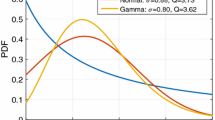Abstract
Experiences of users determine their actions and therefore have great influence on the business result of service providers. Thus, it is highly important to know and control these experiences. Decisions and actions are most effective if they are based on individual users and their detailed experience history. Currently available methods for measuring user experience fail in providing sufficient detail or continuous availability. This paper introduces a big data analytics method, which predicts every user’s satisfaction with the service provider. This is performed using an analytics algorithm, adding psychological interpretation to the measured and individually perceived user’s quality of experience. The result is a score that enables individualized marketing and allows understanding the cause of dissatisfaction. It is also able to assign a subjective quality score to network assets.



Similar content being viewed by others
References
Reichheld F (2003) The one number you need to grow. Harv Bus Rev 81(12):46–54
Reichheld F, Markey R (2011) The ultimate question 2.0: how net promoter companies thrive in a customer-driven world. Harvard Business Review Press, Boston, p 52 ISBN 978-1-4221-7335-0
TM Forum Best Practices RN341 Customer Experience Management Index (CEMI) (2012) Frameworkx version 12.5
ITU-T Recommendation P.800 Methods for subjective determination of transmission quality
Yamamoto LAR, Beerends JG (1997) Impact of network performance parameters on the end-to-end perceived speech quality. In: Proceedings of EXPERT ATM Traffic Symposium
Winkler S (2009) On the properties of subjective ratings in video quality experiments. Proc. Quality of Multimedia Experience, ACM, New York
ITU-T Recommendation P.910 (2008) Subjective video quality assessment methods for multimedia applications
TM Forum Frameworx Best Practice GB962 (2015) Customer Experience Management, Introduction and Fundamentals. Release 14.5.1, TM Forum, Morristown
Gescheider G (1997) Psychophysics: the fundamentals, 3rd edn. Lawrence Erlbaum Associates, Mahwah, p ix ISBN 0-8058-2281-X
Boff KR, Kaufman L, Thomas JP (eds) Handbook of perception and human performance: Vol. I. Sensory processes and perception. In: . Wiley, New York
Ito TA et al (1998) Negative information weighs more heavily on the brain: the negativity bias in evaluative categorizations. J Pers Soc Psychol 75(4):887
Murdock BB Jr (1962) The serial position effect of free recall. J Exp Psychol 64(5):482
Hastie T, Tibshirani R, Friedman J (2009) The elements of statistical learning, Second Edition. Springer Series in Statistics, Springer Verlag, New York, ISBN 978–0–387-84858-7
Rajaraman A, Ullman JD (2014) Mining of Massive Datasets. Cambridge University Press. isbn:978-1107077232
XGBOOST GitHub Project page. https://github.com/dmlc/xgboost
Criminisi A, Shotton J, Konukoglu E (2012) Decision forests: a unified framework for classification, regression, density estimation, manifold learning and semi-supervised learning. Foundations and Trends® in Computer Graphics and Vision 7(2–3):81–227. doi:10.1561/0600000035
Author information
Authors and Affiliations
Corresponding author
Rights and permissions
About this article
Cite this article
Niemöller, J., Washington, N. Subjective perception scoring: psychological interpretation of network usage metrics in order to predict user satisfaction. Ann. Telecommun. 72, 431–441 (2017). https://doi.org/10.1007/s12243-017-0575-6
Received:
Accepted:
Published:
Issue Date:
DOI: https://doi.org/10.1007/s12243-017-0575-6




